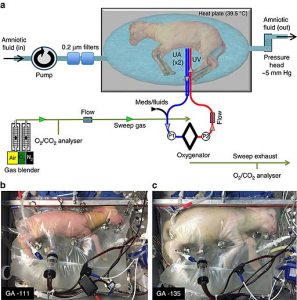You probably have seen it more than once in Sci-fi movies: human babies are incubated in large fluid-filled vessels growing and waiting to come alive. I am not a big fan of such movies, but a recent study has made those scenes one step closer to reality.
A paper published on Nature caught public’s attention in 2017. Scientists at the Children’s Hospital of Philadelphia kept eight premature lambs in an “artificial womb” system to allow those lambs to continue growing outside mother lambs’ body up to four weeks. The “artificial womb” looks a lot like a plastic bag filled with solution which mimics amniotic fluid in the real uterus. The baby lamb’s umbilical cord (containing blood vessels) was also connected to a bunch of tubes which provide oxygen and remove carbon dioxide at the same time.
Scientists of this study think such extra-uterine supporting system would be extremely beneficial for preterm human babies in the near future. Statistics show that infants have lower than 50% survival rate and may face lifelong health issues if they are born at or before 25 weeks. It is also one of the leading causes of new-born death and illness in the U.S. “These infants have an urgent need for a bridge between the mother’s womb and the outside world,” says Alan W. Flake, also the leading researcher of this study. With “artificial womb” like this, doctors and caregivers could keep a premature baby in a “uterus-like” environment longer enough for its important organs to grow and thus significantly reduces the rate of mortality and the risks of other complications.
Although this technology seems incredibly promising and considered as “a pretty momentous achievement” by other researchers in the field, some people also raise ethical concerns about it. Can people abort a “vessel baby”? Who is going to raise the baby if both parents abandon it before it is born? They argue if artificial uterus further extends human’s ability to grow embryos and fetuses, such action would challenge our laws around issues like abortion and reproductive rights. However, other people embrace this technology which may become an option for homosexual males to have their own kids without the use of surrogate and allow women to have children without going through painful labour. Fortunately, we probably won’t see human babies “popped” out of such artificial system very soon since scientists need more time to tackle many technical issues and perfect the “womb”. This leaves the general public and policy makers some time to discuss all the ethical and legal considerations behind it.
Xin Dong

